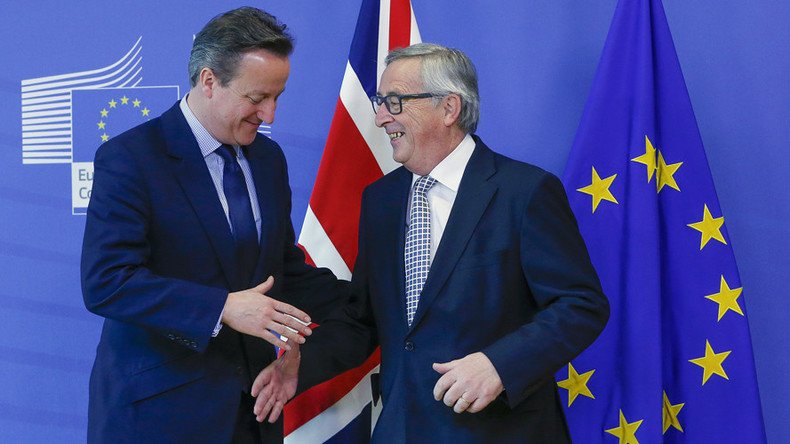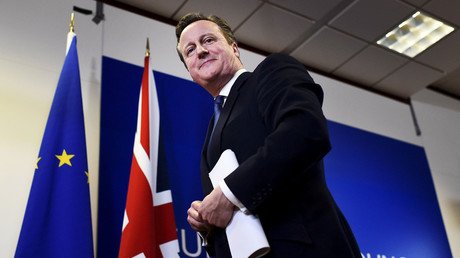5 reasons British voters should reject Brexit

The most important political issue for the people of the UK in a generation will be decided on June 23rd, when they go to the polls to vote on Britain’s membership of the EU.
In recent years, the political and economic behemoth otherwise known as the European Union has become shrouded in controversy, leading to it becoming more a source of disunity among its 28 member states than the unity it was designed to enhance.
The anti-democratic nature of its institutions, its control by European banks and financial institutions, and its evolution into the political and economic arm of NATO in Europe - all these factors have combined to turn the dream of European unity into a nightmare over recent years.
The question for people in Britain, however, is whether the other option – Brexit – offers anything substantially better? Would the British economy be significantly harmed as a result of losing free access to the largest single market in the world? Or would it benefit from being free to establish bilateral trade deals and economic partnerships with other countries throughout the globe, without having to seek and obtain EU approval beforehand?
The answer is that the British economy would undoubtedly be harmed in the short-term and perhaps even long-term in the event of it coming out. Currently, well over half of all British exports, with thousands of British jobs dependent on those exports, go to the EU. Brexit would fracture this export trade, and with the elongated and exhaustive legal, diplomatic, and economic process involved in forging new bilateral trade deals taken into account, those who claim the British economy would be better off are wrong.
The idea the EU is intent on destroying the democratic rights and sovereignty of the British people is a canard.
When it comes to democracy, would the people of Britain feel the benefits of full powers being returned to their own parliament and government?
Here, also, a number of myths concerning the loss of sovereignty to “faceless bureaucrats in Brussels” have been allowed to attain the level of truth. Only around 13.2 percent of Britain’s laws come from Europe. And of those, many are beneficial to the rights and protections of British citizens – i.e. the social chapter, working time directive, consumer protections, human rights. The idea the EU is intent on destroying the democratic rights and sovereignty of the British people is a canard. On the contrary, democracy in Britain continues to be impeded by its unelected second chamber, the House of Lords, and its unelected head of the state, the Monarchy.
Of all the reasons why Brexit will not benefit Britain, its people, or do anything to lessen the threat posed by the EU to Russia’s security, the five most important are:
1. Closer alignment with US foreign policy
Britain outside the EU would move even closer to Washington to compensate, placing more emphasis on its Atlantic alliance in order to bolster its geopolitical status as a major global power. We saw the result of this in 2003 with Blair's support for the Bush administration's war in Iraq.
The destabilization of the region caused by this war led to the emergence of ISIS and the proliferation of terrorism across the world. Britain does not need to be in the EU to constitute a threat to European or global stability.
2. The EU would survive a Brexit
It would continue as before, given the central political and economic role of Germany and France to its existence, and would be more eager to recruit more states into its ranks, with Turkey prime among them.
No Boris bounce for Brexit campaign as Remain pulls ahead https://t.co/JSYr7xF8Oy
— Ian Dunt (@IanDunt) February 26, 2016
3. NATO will not be affected by Brexit
Again, on the contrary, Britain would likely place more emphasis and importance on its membership of this military coalition to compensate.
4. Brexit is being driven by nationalism
This is a phenomenon not unique to the UK alone. Across Europe, this political movement is exerting a dangerous centrifugal political shift in the wake of the global economic crisis such as the continent hasn't experienced since the 1930s. The potential instability if allowed to continue could have dangerous consequences for peace. Here, the lessons of the Second World War should not be lost.
5. Neoliberalism, not the EU, is the real enemy of democracy
The global economic hegemony exerted by neoliberalism has made the concept of national sovereignty in the West redundant. This will not change with regard to the UK in the event of Brexit. Not with the role of the City of London in the financialization of the global economy.
The EU is in dire need of reform. Its institutions have been corrupted by the banks, whose interests it serves to the detriment of the 500 million people living under its umbrella. Reform of those institutions, however, cannot take place until the power of the banks over them and its bureaucrats is broken. In Britain the only political leader who is campaigning to do this, if elected to government, is Jeremy Corbyn.
The role he can play as British prime minister within the EU is far more significant than any he could play without.
The statements, views and opinions expressed in this column are solely those of the author and do not necessarily represent those of RT.
















